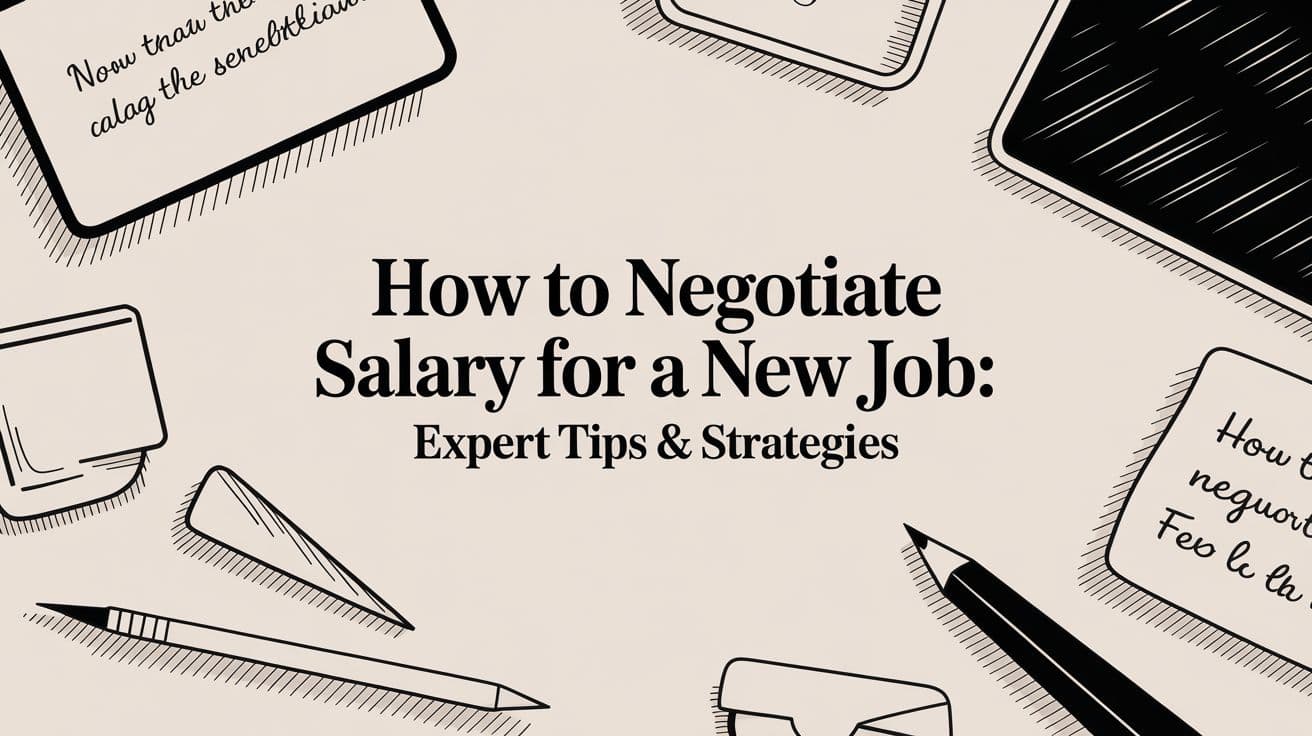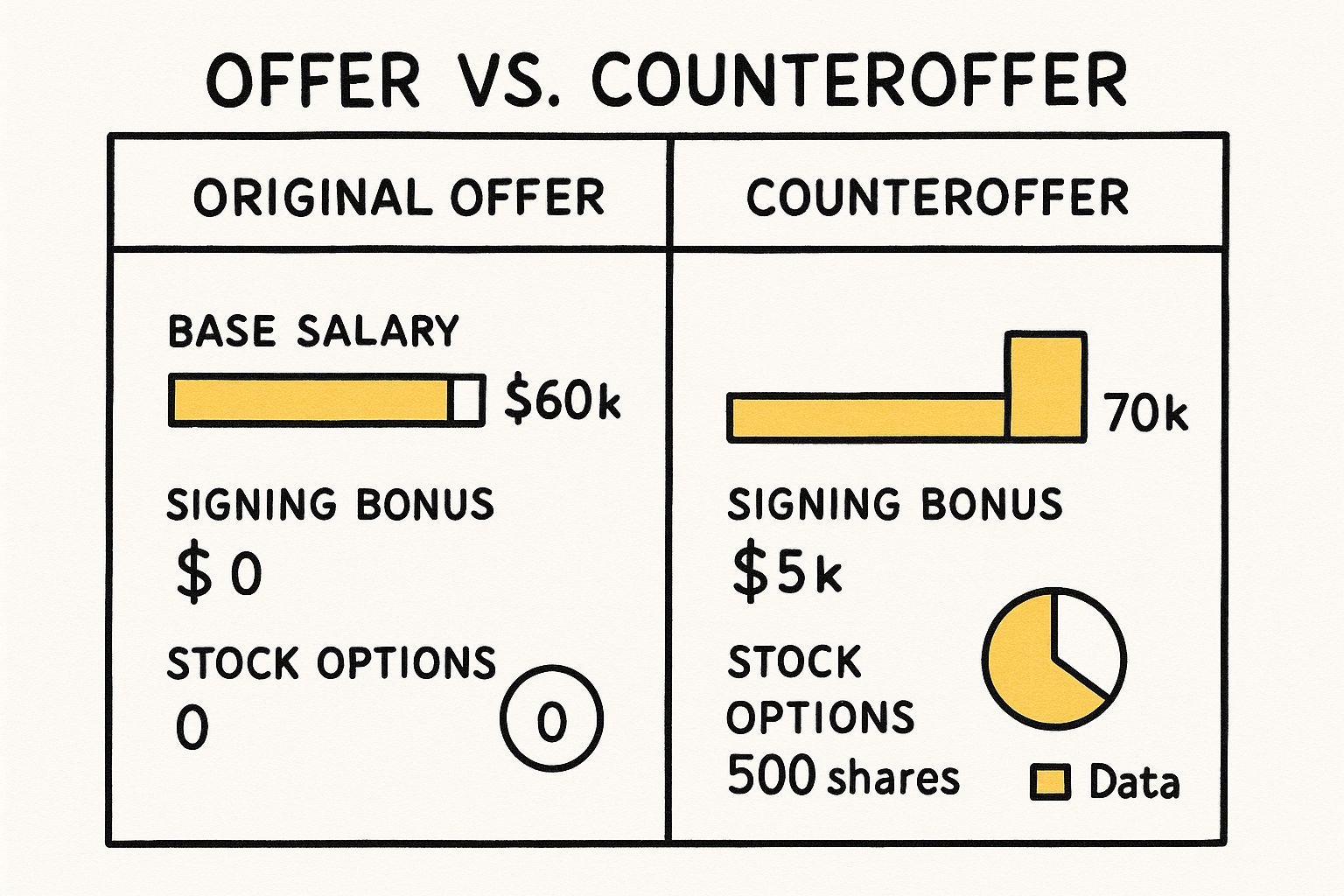How to Negotiate Salary for a New Job: Expert Tips & Strategies
Learn how to negotiate salary for a new job effectively. Discover proven strategies and tips to secure the compensation you deserve today!

Never walk into a salary negotiation blind. If you do, you’re not just unprepared—you’re basically guessing. The most powerful thing you can bring to the table isn't confidence or charm; it's hard data that proves your value in the current market.
Build Your Case with Solid Salary Research

Before you even dream of a number, you need to build an airtight case for it. A strong argument isn't about what you feel you're worth. It's about what the market says your skills, experience, and location are worth. Doing this homework turns your "ask" from a hopeful wish into a serious business proposal.
This research also gives you a dose of reality. For instance, knowing that the average U.S. employer has a salary increase budget of around 3.9% for 2025 helps you understand the landscape. Similar trends are seen across the UK and Canada. This tells you that big raises don't just happen; they’re the result of a deliberate, well-argued negotiation that goes far beyond the standard cost-of-living bump. You can learn more about these salary budget trends to get inside the head of the person on the other side of the table.
Gather Your Intel from Multiple Sources
One of the biggest mistakes people make is checking one salary website and calling it a day. To get a number you can actually trust, you need to pull data from several places. Each one has a slightly different way of calculating things, so blending them gives you a much clearer, more defensible range.
- Online Salary Calculators: Start with well-known tools like Glassdoor, Levels.fyi (an absolute must for tech roles), and Salary.com. Be specific with your job title, city, and years of experience.
- Company-Specific Data: Dig around for self-reported salaries for the exact company you’re talking to. This can give you clues about their internal pay bands and how they value certain roles.
- Industry Reports: Check if any professional associations in your field publish their own compensation surveys. These are often goldmines of detailed information broken down by seniority and region.
Your goal here isn't to find a single magic number. It's to establish a realistic and defensible salary range. Once you have it, aim for the 75th percentile of that range, especially if you bring specialized skills or a track record of high performance to the table.
To help you organize this, here's a quick guide to what you should be collecting.
Your Salary Negotiation Toolkit
This table is your quick reference guide to the essential information and resources you should gather before you start talking numbers.
| Resource/Tool | What to Look For | Why It Matters |
|---|---|---|
| Glassdoor, Levels.fyi, Salary.com | Salary ranges for your specific title, experience level, and geographic location. | Establishes a baseline market rate and helps you create a data-backed range. |
| Company-Specific Reviews | Self-reported salaries and compensation details for the target company. | Reveals the company's internal pay structure and what they're likely to offer. |
| Industry Compensation Surveys | Detailed salary data from professional organizations in your field. | Provides highly credible, niche data that can strengthen your case. |
| Job Postings for Similar Roles | Salary ranges listed in job descriptions (where available). | Gives you a real-time pulse on what companies are willing to pay right now. |
| Peers in Your Network | Insights on market rates, bonus structures, and benefits. | Offers invaluable real-world context that data alone can't provide. |
Having this toolkit ready makes you feel prepared and ensures your arguments are grounded in fact, not just feeling.
Look Beyond the Base Salary
A job offer is a package deal. It's easy to get fixated on the base salary, but that's only one piece of the puzzle. A slightly lower base might be a great deal if it comes with a monster bonus or equity that could be worth a fortune down the road.
Always look at the total compensation picture:
- Performance Bonuses: What’s the target percentage? More importantly, how often do people actually get it?
- Signing Bonus: Is it standard for this role and level?
- Stock Options or RSUs: Understand the vesting schedule and the potential upside.
- Benefits: Don't forget to factor in the quality of health insurance, 401(k) or pension matching, and paid time off.
Talk to Real People
Data is crucial, but it can’t tell you the whole story. The best insights often come from quiet conversations with people in your network. Reach out to a few trusted contacts who are in similar roles or work at companies you respect.
You don't have to awkwardly ask, "What's your salary?" Try a softer approach. "Hey, I'm getting ready to negotiate for a Senior Product Manager role in Chicago. My research is pointing to a range of $140k-$160k. From what you're seeing, does that feel right for the market?"
This collaborative framing makes people feel like they're helping a colleague, not revealing state secrets. Their feedback is the final, human-powered piece of your research puzzle—it can confirm your data or warn you if you're way off base.
Mastering the Timing of the Salary Talk
 Knowing when to talk about money is just as important as knowing what number to ask for. Jump the gun, and you might come across as someone only interested in the paycheck. But if you wait too long, you could lose your chance to negotiate effectively.
Knowing when to talk about money is just as important as knowing what number to ask for. Jump the gun, and you might come across as someone only interested in the paycheck. But if you wait too long, you could lose your chance to negotiate effectively.
The real art is in proving your value first. Make them want you for the skills and experience you bring to the table. Once they're sold on you, the compensation conversation becomes a much more natural and powerful next step.
There's an old rule in negotiation that holds true here: he who says a number first, loses leverage. When a recruiter asks for your salary history or expectations on that first call, they're trying to set an anchor. Your goal is to politely sidestep that question until you have an actual job offer.
When Recruiters Ask for a Number Early
It's a classic move. You're barely 15 minutes into a screening call, and they hit you with it: "So, what are your salary expectations?" It's not about being difficult; it's about being strategic. You need to delay this conversation until you’ve had the chance to understand the role inside and out.
Here are a few ways to pivot without shutting down the conversation:
- Bring it back to the role: "I'm really focused on understanding the role and seeing if I'm the right fit for the team. I’m confident that if we both feel it's a match, we can agree on a salary that's fair and competitive."
- Flip the question: "That's a great question. It would be helpful to know what salary range you've budgeted for this position, as that would give me a better sense of your expectations."
- Talk about the whole package: "My salary needs are flexible, as I'd be looking at the entire compensation package—benefits, bonuses, and other perks. For now, I'm most interested in learning more about this opportunity."
These responses signal that you're a serious candidate who's more invested in the long-term fit than just a quick payday. This is a fundamental part of learning how to negotiate salary for a new job.
The strongest negotiating position you can possibly have is when the company has already decided they want you. Always wait for the written offer. The conversation completely changes from "Is this the right person?" to "What will it take to get this person on our team?"
The Power of the Official Offer
The moment that official offer lands in your inbox, the entire dynamic shifts in your favor. You're no longer just one of many candidates—you are their top choice. This is your green light to start talking numbers.
By holding out until this point, you've achieved two key things. First, you've allowed them to become fully invested in the idea of you in this role. Second, by getting them to name the first number, you now know their starting point and have a much clearer picture of their budget.
From here, you can use your research to build a thoughtful counteroffer from a position of confidence, not from a defensive stance.
How to Craft a Compelling Counteroffer
So, you have the official offer in hand. Great! Now the real work begins. This is where all your preparation pays off, allowing you to build a strong, data-backed counteroffer. The goal here isn't just about asking for more; it's about making a solid business case for why you're worth more. When done right, a counteroffer feels less like a demand and more like the first step in a great partnership.
Your tone is everything. Always, always start by expressing genuine excitement for the role and the company. This immediately sets a positive, collaborative mood and shows them you’re serious about joining the team. Once you’ve established that, you can naturally pivot to the details of your proposal.
Justify Your Ask with Data and Value
A counteroffer built on feelings is a counteroffer that fails. It needs to be firmly rooted in facts. This is your chance to connect the dots between your market research and your specific skills. You’re not just another "Senior Software Engineer." You’re a Senior Software Engineer who has a proven history of cutting production bugs by 15% and has experience mentoring junior devs—two things you know are priorities for their big upcoming project.
You need to weave your specific achievements into the conversation, framing your request around the value you’ll bring to them.
- Bring up market data: Casually mention that your research for similar roles in the area points to a higher salary band.
- Connect to past wins: Remind them of a key problem you discussed in the interview. For example, "When we talked about the need to expand into new markets, it reminded me of my last project where I led an initiative that grew international user engagement by 20%."
- Lean on unique skills: If you have a rare certification or specialized expertise, this is the time to highlight how it directly supports their goals.
Take a look at how a counteroffer can completely reshape an initial proposal. It's not just about the salary; it's about the whole picture.

As you can see, a smart negotiation can lead to improvements across the board, creating a far more attractive total compensation package.
Frame Your Counteroffer as a Collaboration
How you say it matters just as much as what you say. Steer clear of ultimatums or demanding language. Instead of a blunt, "I need $75,000," rephrase it as a collaborative question.
Try something like this: "Based on my experience leading successful product launches and the market data for this type of role, I was really targeting a base salary in the $75,000 to $80,000 range. Is there any flexibility on your end to get closer to that figure?"
This phrasing keeps the conversation going and positions you as a thoughtful, reasonable professional.
Key Takeaway: Always wrap up your counteroffer on a positive, forward-looking note. A simple, "I'm incredibly excited about the possibility of joining the team and feel confident we can land on a number that works for everyone," reinforces your enthusiasm and signals you’re ready to find a solution.
If you’re feeling nervous about pushing back, don't be. Negotiation is the new normal. Recent salary negotiation trends show that a whopping 67% of professionals successfully negotiated their salary in 2025. Companies honestly expect it. By presenting a respectful, well-researched counter, you’re just participating in a standard part of the hiring game.
Negotiating Beyond Your Base Salary

It’s easy to get fixated on that one big number, but a truly great offer is about the whole picture. So what happens when the company says they've hit their absolute max on base pay?
That doesn't mean the conversation is over. It just means it's time to get creative. This is where you can shift the focus and build a total compensation package that genuinely supports your life, both in and out of the office.
If you hit a wall on salary, keep the tone positive and pivot. Something as simple as, "I understand the constraints on the base salary. I'm still very excited about the opportunity, so I'd love to explore other areas to make the total package a great fit," can work wonders. It shows you're a collaborative problem-solver, not just a salary-chaser.
Expanding Your Total Compensation
Once that door is open, you can start discussing other high-impact items. Often, a company has more flexibility with one-time costs or non-salary benefits than they do with a recurring line item like base pay.
Here are a few monetary perks worth exploring:
- Signing Bonus: A one-off cash payment is often the path of least resistance for a hiring manager. You can frame it as a way to ease your transition into the new role.
- Performance Incentives: Show them you’re ready to deliver results. You could propose something specific, like, "If I'm able to achieve X within the first six months, could we agree on a performance bonus of Y?"
- Stock Options or RSUs: This is a big one, especially in tech and at startups. Equity can have a huge long-term financial impact. Don't be afraid to ask about the vesting schedule and what the grant represents.
It’s natural to feel nervous about negotiating, but the numbers don't lie. The risk is small, and the reward is often significant. For example, a whopping 79% of Gen Z who negotiate see their offer improve. The lesson? It almost always pays to ask. You can dig into more eye-opening numbers from these recent salary negotiation statistics.
Prioritizing Work-Life Integration
Money isn't everything. Sometimes, the most valuable perks have nothing to do with your bank account. These benefits can have a massive impact on your day-to-day happiness and long-term career trajectory—often more than a few extra thousand dollars would.
Think about what really moves the needle for you:
- More Paid Time Off: An extra week of vacation every year? That’s priceless.
- Flexible or Remote Work: Getting a hybrid schedule or a few guaranteed work-from-home days can be a game-changer.
- Professional Development Budget: Ask for an annual stipend for courses, certifications, or conferences. It's a direct investment in your growth.
- Earlier Performance Review: Requesting a salary review at six months instead of the typical year gives you a chance to prove your worth and accelerate your earning potential.
To help you think through the possibilities, here’s a breakdown of common negotiable items that go beyond your paycheck.
Negotiable Elements Beyond Your Base Pay
| Benefit | What to Ask For | Potential Impact |
|---|---|---|
| Signing Bonus | A one-time cash payment to offset transition costs or a salary gap. | Provides immediate financial relief without increasing the company's long-term salary costs. |
| Performance Bonus | A bonus tied to achieving specific, measurable goals within a set timeframe (e.g., 6-12 months). | Aligns your success with the company's, showing confidence and creating a win-win scenario. |
| Additional PTO | An extra 5-10 days of vacation or personal time annually. | Significantly improves work-life balance and prevents burnout, which is invaluable. |
| Equity (Stock/RSUs) | A larger grant of stock options or Restricted Stock Units (RSUs) with a clear vesting schedule. | Can lead to substantial long-term wealth, giving you a tangible stake in the company's success. |
| Professional Development | A dedicated annual budget for courses, certifications, or industry conferences. | Directly funds your skill development, making you a more valuable employee over time. |
| Flexible Work | A hybrid schedule, specific work-from-home days, or flexible hours. | Offers greater autonomy and can drastically reduce commute time and costs. |
Ultimately, a successful negotiation results in an offer that feels right for you. By looking at the complete package, you can craft a role that not only pays you what you're worth but also supports the life you want to live.
Sealing the Deal: How to Professionally Finalize Your Offer
You’ve done the heavy lifting. You navigated the tricky back-and-forth, and now you have an agreement that feels right. Don't let your guard down just yet—these final steps are what lock in your success and set the tone for your entire tenure with the company.
Once you have a verbal "yes" on the big stuff, your first move should always be to express genuine gratitude and excitement. Something as simple as, “Thank you so much! I’m thrilled we were able to get here, and I can’t wait to join the team,” makes a huge difference. It reinforces your commitment and keeps the relationship warm and positive.
But even with all the good vibes, there's one golden rule: get it all in writing. A verbal promise is just that—a promise. The official, written offer letter is the only thing that counts. It’s your safety net and the company's, protecting everyone from "he said, she said" down the road.
Getting All the Details on Paper
Your final offer letter should be a crystal-clear summary of everything you've discussed. Before you even think about signing, take a deep breath and review every single line. This is your last chance to catch any mistakes or forgotten details.
Here’s a quick checklist of what you need to see in that document:
- Official Job Title: Is it the exact title you agreed on?
- Base Salary: The final annual salary number.
- Bonus Structure: Clear details on any performance bonuses, signing bonuses, and when they get paid out.
- Equity: The nitty-gritty on stock options or RSUs—the number of shares, grant price, and the full vesting schedule.
- Start Date: Your official first day.
- Paid Time Off: The total count of vacation, sick, and personal days.
- Benefits Information: A summary of health insurance, 401(k) or other retirement plans, and any other key perks.
- Negotiated Extras: Written confirmation of anything special you discussed, like a professional development budget or a flexible work arrangement.
What if something is missing or doesn't look right? Don't freak out. Just send a polite, professional email to the hiring manager or HR. Frame it as a simple clarification. For example: "This is fantastic, thank you! I just had a quick question—I didn't see the professional development stipend we talked about. Could you clarify where I can find that?"
Knowing when to say "yes" is more art than science. If the final offer hits all your must-haves, reflects the market rate you researched, and addresses your main asks, it's probably time to accept. Pushing for one more tiny win at this late stage can sometimes backfire and create unnecessary friction.
Finalizing the deal like a pro is the last piece of the puzzle when learning how to negotiate salary for a new job. By getting every last detail in writing and keeping things positive, you’re not just starting a new job—you’re starting it on a foundation of clarity, respect, and shared excitement.
Answering the Tough Questions in a Salary Negotiation
Even when you’ve done all your homework, you're bound to hit a few tricky spots. Getting stuck on a tough question can rattle anyone, but knowing what to expect is half the battle. Let's walk through some of the most common curveballs you might face.
Knowing how to handle these moments keeps the conversation moving forward and shows you can think on your feet—a valuable skill in any role.
"So, What's Your Current Salary?"
This is probably the question people dread the most. The good news is, a growing number of states and cities have actually made it illegal for employers to ask. But if it does come up, your goal is to politely sidestep it and pivot the conversation back to your future value.
Honestly, what you made at your last job has nothing to do with what this new role is worth. It's an outdated way to anchor the negotiation in their favor.
Try saying something confident and forward-looking, like: “I’m focusing on opportunities that match my experience and the current market value for this kind of role. Based on my research, that seems to be in the [Your Target Range] range. I’m sure we can land on a figure that’s fair for both of us if the fit is right.”
This little bit of verbal judo does two critical things:
- It keeps them from latching onto your old, likely lower, salary.
- It immediately refocuses the discussion on the value you'll deliver to their company.
"What if They Pull the Offer if I Negotiate?"
This is a huge fear, I get it. But let me put your mind at ease: it is extremely rare for a company to withdraw an offer just because you tried to negotiate. For professional roles, a thoughtful counteroffer isn't just common; it's expected.
The only time you’re really at risk is if your request is completely out of touch with reality or if you come across as demanding and unprofessional.
Think of it this way: A professional, well-reasoned negotiation shows you know your worth and have solid business sense. Those are traits great employers want. If a company bails after a respectful negotiation, you might have just dodged a bullet. It can be a major red flag about their culture.
Remember, they've already sunk a ton of time and resources into finding you. They've interviewed, vetted, and chosen you over everyone else. They want this to work. A negotiation is just the final step in making sure you both start off on the right foot.
"How Do I Negotiate if the Offer Is Already Pretty Good?"
First off, congratulations! A strong opening offer is a fantastic sign. It means they really value what you bring to the table and aren't trying to lowball you. But don't assume the conversation is over. Even a great offer can have room for improvement.
When the base salary is already solid, it’s the perfect time to shift your focus to the rest of the compensation package.
You have a lot more to negotiate than just the base number. Consider asking for other perks that might be easier for them to approve:
- A signing bonus is a great way to cover any bonus you’re leaving behind or just to make the transition smoother.
- An extra week of paid time off can be more valuable than a small salary bump when it comes to work-life balance.
- A professional development stipend for courses, conferences, or certifications shows you're invested in growing with them.
- An earlier performance review, maybe at six months instead of a year, which could accelerate your next raise.
Framing your counteroffer this way demonstrates that you’re thinking about your long-term success with the company, not just nickel-and-diming them. It shows you’re a strategic partner, not just a prospective employee.
Feeling prepared is one thing, but practicing is another. At SalaryCoach.ai, you can rehearse these exact scenarios in realistic, AI-powered mock negotiation calls. Get instant, actionable feedback on your phrasing, timing, and strategy in a private, judgment-free environment. Build the muscle memory and confidence you need to secure the compensation you deserve. Try your first session free at SalaryCoach.ai.
Article created using Outrank
Ready to Practice Your Negotiation Skills?
Start practicing with our AI coach and build confidence for your next salary negotiation.
Start Practice Call